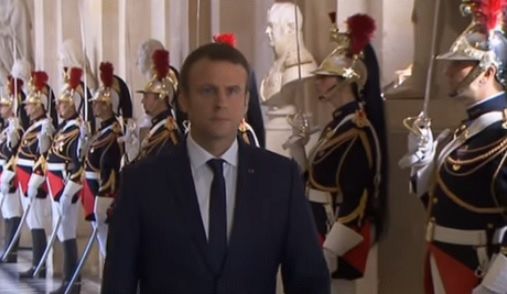President Emmanuel Macron intends to transform France. Then Europe. Then the world. Early moves have been quelques surprises for partisans and detractors alike.
Following his 90 minute speech to parliamentarians in Versailles on Monday, critics described him as “Napoleonic”, “acting like Versailles royalty” and “a challenge to French traditions”. Macron’s supporters agreed.
Several proposed reforms will be watched keenly to see if they might work elsewhere. There are at least five.
Grandiose aspirations
Macron told European newspapers that his ascendancy is
“...the beginning of a French renaissance and I hope a European one as well ... that will permit the rethinking of great national, European and international equilibriums.”
He called in his Versailles speech for France to become
“... the centre of a new humanist project for the world.”
Macron’s extravagant ambitions prompted the label ‘Jupiter’ on a newsmagazine’s cover, evoking the omnipotent Roman god of heaven and Earth who embodied commitment to duty and morality.
It has caught on.
What are the aspirations of comparable statesmen? Australia’s elected leader seems satisfied with “jobs and growth”, which in most countries most of the time is the normal course of events.
Laws direct from the president
Macron wants the parliament to “legislate less” but “act faster”. He intends to streamline the process by framing vital laws himself, then sending them to the Assembly and Senate for rapid ratification. This subverts the arduous process of having the office of a minister or the prime minister develop legislation, then getting parliamentary approval and, finally, presidential assent.
Macron has risked upsetting legislators by suggesting that if his “profound reforms” are not endorsed he will take them to the citizens via a referendum.
With a strong majority of Macronist MPs in the Assembly – 351 out of 577 – this seems a reasonable risk.
Legislators from outside politics
Macron’s 22 cabinet ministers were drawn from the left, right and centre of French politics. Some were plucked from outside politics altogether, including diplomat Nathalie Loiseau and Nicolas Hulot, the host of a popular TV show on nature and the environment.
This is not new to Macron, of course, but he has taken it a step further. His endorsed candidates for the Assembly included an unprecedented range of non-politicians, from a retired bullfighter and an air force fighter pilot – both women – to a Fields medallist mathematician to farmers and nurses.
Macron himself served as Minister for the Economy and Industry in François Hollande’s government from 2014 to 2016 having never stood for office.
This circumvents the predicament in some Westminster democracies – notably in Australia today – where none of the Government MPs in the House or the Senate has the experience or competence for critical portfolios.
PARIS —Prosecutor's office investigating irregularities in the high-profile trip to Las Vegas by Emmanuel Macron. https://t.co/icvvEpdzVY
— ✩chiℓℓ✩ (@chiIIum) July 7, 2017
Zero tolerance of corruption
Macron has already sacked four members of his hand-picked cabinet following accusations of corruption. Such was his speed – protestations of innocence notwithstanding – that National Front leader Marine Le Pen described the four as tossed out “like an old rag”.
The rest of the administration is clearly on notice.
Well might Macron focus on this. Corruption has been more common in France than in most Western democracies, although less than in Italy. Indeed Macron himself overtook François Fillon as presidential frontrunner when the fancied Les Républicains candidate was accused – and eventually charged – with corruption.
Civility and courtesy
Before and since his ascendancy, Macron’s demeanour towards his opponents has been unusually polite and respectful.
Roger Cohen observed recently recently in the New York Times:
‘Above all, through his intelligence and civility, his culture and his openness, Macron has erected a much-needed barrier to the crassness and incivility, the ignorance and the closed-mindedness that seeps from Trump’s Oval Office and threatens to corrupt the conduct of world affairs.’
Macron’s borrowed ideas
This cuts both ways. If other countries take Macron’s lead, he is clearly open to learning from others, including Westminster democracies like Australia.
He intends to reduce the number of elected members and senators by one third, from 925 to 617.
At an annual cost of A$520,000 each, that will save around A$160 million a year. It will reduce the ratio of politicians to citizens from one per 72,000 to one per 108,000. That’s close to Australia’s one Senator or MP per 106,800.
Steve Bell on Emmanuel Macron’s speech in Versailles – cartoon https://t.co/KYQiEfyVKj
— Victor Martin Hunt (@Methusalada74) July 6, 2017
Macron has foreshadowed direct democracy via petitions from citizens, a strong tradition in Switzerland, Denmark and other European countries, though not in France.
He has also indicated support for a “dose” of proportional representation in future elections. This should further disadvantage the two traditional political groupings — Les Républicains on the right and the fractured parties on the left.
How will these all work in practice? Will Macron become a role model? Attend et voir venir. Time will tell.
You can follow Alan Austin on Twitter @AlanAustin001.

This work is licensed under a Creative Commons Attribution-NonCommercial-NoDerivs 3.0 Australia License
Monthly Donation
Single Donation
A new way. Subscribe to IA.












